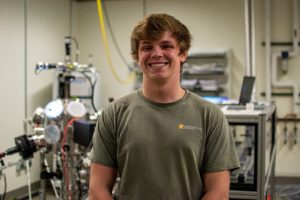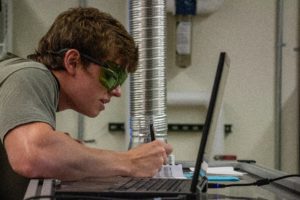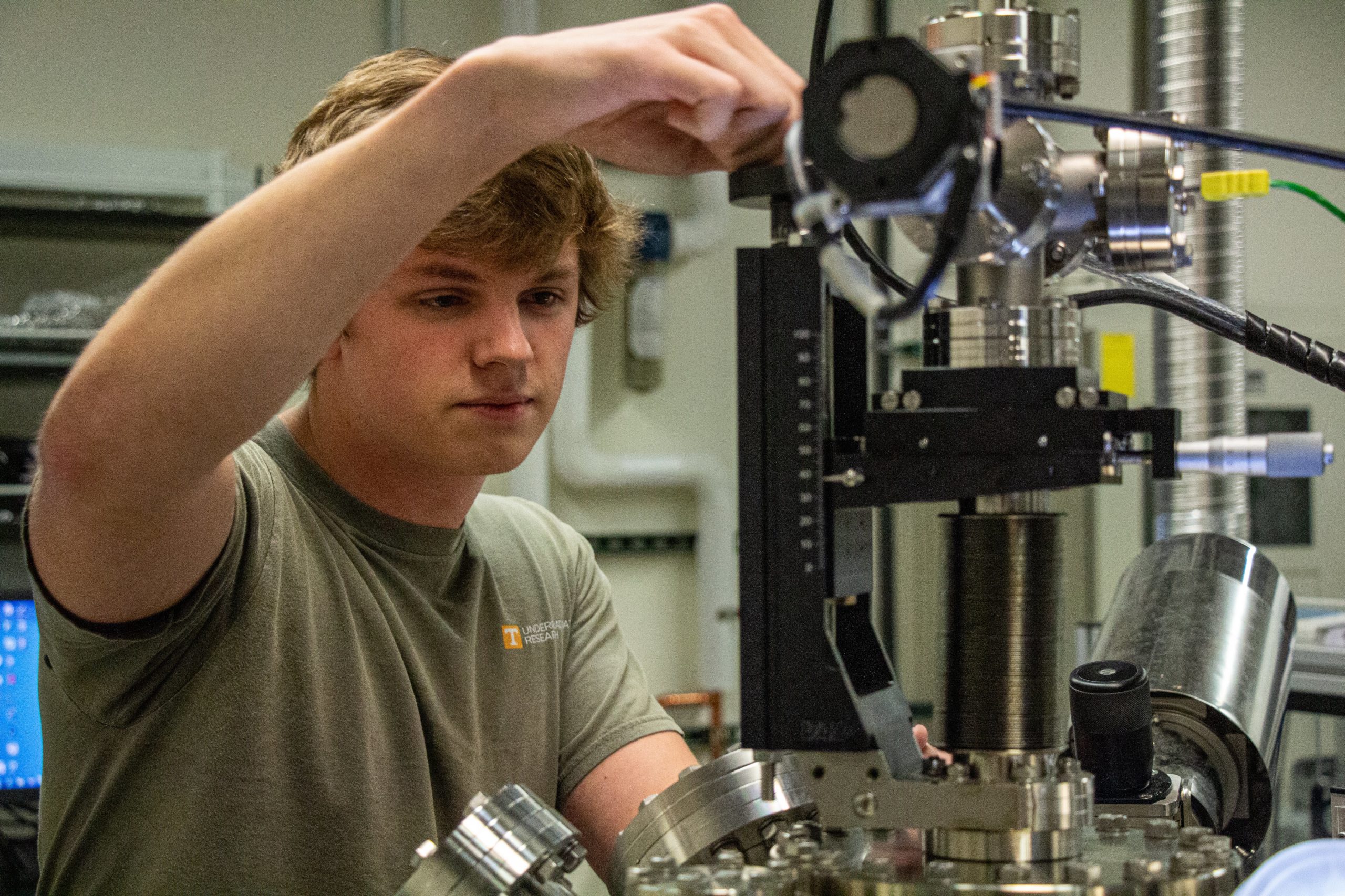Kyle Noordhoek of Grand Rapids, Michigan is a senior majoring in Physics and Chemistry at the University of Tennessee, Knoxville, and he is trying to make your phone work better.
Noordhoek had always been interested in how phones and computers worked on an atomic level, which lead him to pursue research in materials science. As a freshman, he was introduced to Dr. Jian Liu through the Office of Undergraduate Research’s Living Learning Community, Discovery LLC. Noordhoek has worked as a research assistant for Dr. Liu ever since. We caught up with him as he was working at the Joint Institute for Advanced Materials (JIAM). He stated, “Research was particularly interesting to me because it gives an opportunity to work at solving specific issues. Most of the time, in a classroom setting, we go over the fundamentals and a lot of broad topics. With research, I was able to get hands-on with a more specific topic.”
Noordhoek has contributed to research being done on materials that make up our electronic devices in a couple of ways.
For the past four years, he has been working with Liu’s team to grow conducting material, such as metal, on top of insulating material, such as plastic. “All of our electronic devices, such as phones, computers, and televisions, require the use of conducting materials to function”, Noordhoek explained. “Essentially what I have done…is grow a conducting material (Bi2Ir2O7) on top of materials that exhibit a transition into a spin ice ground state (Dy2Ti2O7). Because most of the materials that exhibit this state are insulating, it is difficult to use them in any sort of technology. If we are able to measure the transition through a conducting layer, it would make the material more useful in current technologies, as well as provide a new way to probe the physics of the system.”
The team’s effort has been successful: “We have produced some promising results in the form of being able to measure phase transitions through conducting layers. This has helped to broaden the study to other materials which provides many opportunities for new research.”
In addition to his contribution to the team, Noordhoek is working independently to improve memory storage in electronic devices: “Currently, I work on my own project supervised by Dr. Liu…the growth and characterization of frustrated magnetic materials. Our hope is that frustrated magnets will be used in memory storage. They have the potential to expand the amount that we are able to store on smaller sized devices, such as hard drives. Current storage relies heavily on ferromagnetic materials, which are largely limited in their capacity.”
 Noordhoek explained that his research experience has not been void of challenges: “We have had our fair share of failures on the project.” Those challenges, however, eventually lead to some promising rewards. Noordhoek stated, “I think what is most rewarding is seeing that hard work pay off. After many failures or difficulties getting samples that are good enough to measure, it is a fantastic feeling seeing the data from a great sample. It generally opens up a lot of new possibilities.”
Noordhoek explained that his research experience has not been void of challenges: “We have had our fair share of failures on the project.” Those challenges, however, eventually lead to some promising rewards. Noordhoek stated, “I think what is most rewarding is seeing that hard work pay off. After many failures or difficulties getting samples that are good enough to measure, it is a fantastic feeling seeing the data from a great sample. It generally opens up a lot of new possibilities.”
Noordhoek’s research has led him to present at multiple conferences, including the National Conferences on Undergraduate Research (NCUR) and the Southeastern Section of the American Physical Society Annual Meeting (SESAPS). It has also shaped his way of thinking: “…Critical thinking is something that is always emphasized. It is important to make sure that we understand why we are doing something, not just how to do it.”
When asked what advice he would give to undergraduates looking to get involved in research, he said, “As simple as it sounds…just go talk to your professors. Also, you don’t necessarily have to be in the same field as a professor to do work with their group. We are a physics group, but we work with a lot of chemists and electrical engineers too. Research is very specific, so if you enjoy a topic, then odds are you can learn what you need to know to participate.”
Noordhoek will leave Dr. Liu’s lab when he graduates next year, but encourages anyone interested in this kind of research to reach out: “If anyone is interested in this work, they’re always welcome to come talk to us. Dr. Liu is always looking for outreach opportunities and new students to take on.”
If you would like to know more about how you can do research in your field, or how to join the Discovery LLC, get in touch with the Office of Undergraduate Research at ugresearch@utk.edu.
